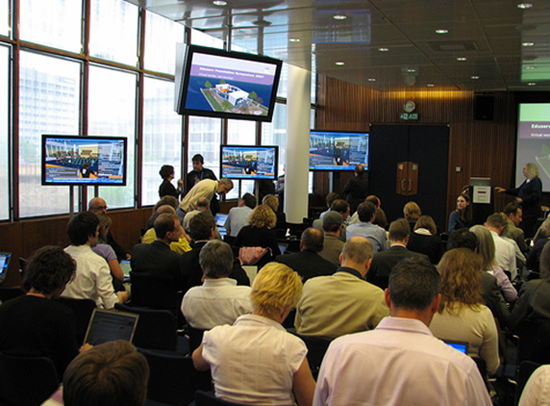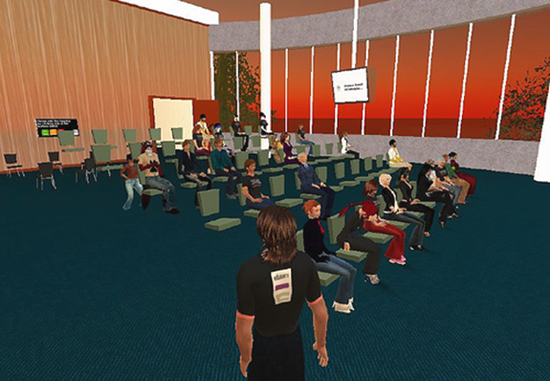FEATURED 3D PROJECT: VIRTUAL WORLDS, REAL LEARNING?
EDUCATION IN SECOND LIFE
by Andy Powell, Eduserv Foundation, UK.
Keywords: E-learning, 3D environments, Second Life, Eduserv Foundation, UK.
Introduction
At the beginning of 2007 the Eduserv Foundation1
announced its annual call for research grants, asking for bids in one of three areas:
the teaching and learning opportunities offered by 3D virtual worlds such as Second Life, new approaches to learning based on Web 2.0,
and the use of new approaches to access and identity management (such as OpenID) in e-learning. Of the 96 bids received, 92 were in the area of 3D virtual worlds such as Second Life; this despite the fact that the call had been clear about
the limited number of grants (3 or 4) available. It was obvious that we had tapped into something of significant interest to the academic community in the UK.
As a result of the call four projects were funded, three of which are directly concerned with using Second Life to support learning. The forth project is primarily
about the use of Web 2.0 approaches to building social networks in the area of computer modelling but offers significant possibilities for embedding those models
within Second Life at some point in the future. Details of each of the projects are provided below.
Eduserv Foundation Symposium

Fig. 1. Eduserv Foundation Symposium, Virtual worlds, real learning?, Congress Centre, London, 10th May 2007.
© Eduserv Foundation. Reproduced with kind permission.
Given the obvious interest in the use of Second Life and other 3D virtual worlds within the education community, the Eduserv Foundation took the decision to focus its
annual symposium for 2007 on that topic. Virtual worlds, real learning? took place at the Congress Centre in London on 10th May, attracting
around 130 delegates to the real-world event, with about 75 people attending in three virtual venues in Second Life. A specially constructed building on Eduserv Island
was inspired by the Council Chamber at the real-life venue.

Fig. 2. Eduserv Foundation Symposium, Virtual worlds, real learning?, Eduserv Island, Second Life, 10th May 2007.
© Eduserv Foundation. Reproduced with kind permission.
The technical set up for the event was quite complex because the real-world presentations from the symposium were streamed in real time into the three venues in Second Life,
allowing virtual delegates to take part in the event. Several large, flat-screen monitors were also placed around the real-life venue, showing what was happening in Second Life.
There were surprisingly few hitches with the technology. The streamed video was very clear, using an embedded window within the screen to show both slides and the speaker’s face.
Inevitably, the experimental nature of the symposium meant we learned a lot about how events of this kind work best. There is no doubt that if we did the event again now,
we would do some things differently. For example, one thing that was not really achieved was any true integration of real and virtual delegates. We wanted to encourage questions
from the virtual delegates during the day, but in practice this was only allowed in any real sense during the final panel session, meaning that Second Life delegates were on
the receiving end of a one-way stream of information for the bulk of the symposium. With hindsight, we should have found some way of allowing the virtual delegates to 'mingle'
with the real-life delegates before the event and to directly ask questions of all the speakers as the day progressed.
Although billed as focussing generically on 3D virtual worlds, the day inevitably concentrated primarily on Second Life, largely because that is where most of the virtual
world e-learning experimentation is taking place currently. The stated aim of the symposium was to try and look past the hype that surrounds Second Life in order to try and form
a balanced view of its capabilities in the context of education. To that end we invited a range of speakers, from both within and without academia and offering both positive
and negative views of Second Life.
The day started with Jim Purbrick from Linden Lab (the makers of Second Life) who gave an introduction to Second Life and outlined the wide range of 'informal skills' that
are learned by using 3D virtual worlds: design skills, social skill, entrepreneurial skills, programming skills, organisational skills, communication skills and so on. Several
people then gave practical accounts of how their organizations were using Second Life including Roo Reynolds from IBM, Hamish Macleod from Edinburgh University, Gilly Salmon
from Leicester University and Joanna Scott from the Nature Publishing Group. Finally there was a more sceptical opinion on Second Life given by Stephen Downes from the National
Research Council of Canada. All the presentations from the day are available on the Eduserv website
and alongside the Virtual Congress Centre on Eduserv Island in Second Life.
The event finished with a Panel Session including all the speakers and Sara de Freitas from Birkbeck College, London, who has recently completed a study on game based
learning.2 The panel session was chaired by Diana Laurillard of the London Knowledge Lab, University of London.
The symposium certainly succeeded in making delegates more aware of the capabilities of 3D virtual worlds like Second Life in education. It also raised questions
about where we are as a community in terms of understanding how we should best use these kinds of tools and, not least, how sensible it is to employ the use of commercially driven,
external services in the delivery of teaching and learning.
Eduserv Foundation Grants 2007
As a result of the 2007 call for funding outlined above, the Eduserv Foundation funded the following projects:
- SLEUTH – Second Life Educational Undertakings in Theatre History
This 24 month project, led by Richard Beacham (Centre for Computing in the Humanities, King's College London), will construct 20 historic theatres in Second Life, creating an extensive,
content-rich range of research-based virtual environments, and generating innovative, interactive teaching and learning resources. The project will combine the pedagogical,
research, technical and methodological expertise of a group of national and international leaders in their fields, including: Hugh Denard (King's Visualisation Lab); The Higher Education Subject Centres for English, and for Dance, Drama and Music, as well as members of the communities that they serve;
David Kaskel (LanguageLab); Mark Childs, consultant in Educational Technology, and King's Digital Consultancy Service.
- Learning from Online Worlds; Teaching in Second Life
This 12 month project, led by Diane Carr and involving Martin Oliver and Andrew Burn (all at the London Knowledge Lab, University of London) will research and theorise learning
in two online social worlds, World of Warcraft and Second Life. The project will use this theory to develop practical recommendations for learning and teaching,
and test these by teaching courses in Second Life.
- Online Learning with Immersive Virtual Environments using Sloodle
This twelve month project, led by Dan Livingstone (University of Paisley) and involving Jeremy Kemp (San Jose State University), will research and develop pedagogical
theories relevant to multi-user 3D virtual worlds and use these to inform and lead the development of Sloodle and to support the growing community of educators using 3D
virtual worlds.
- Modelling4All – Web services to enable non-programmers to collaboratively build and analyse computer models
Computer modelling is playing an increasingly important role in fields as varied as sociology, epidemiology, zoology, economics, archaeology, ecology, climate, and engineering.
This project, led by Ken Kahn and involving Howard Noble (both at the Oxford University Computing Services), will attempt to make such modelling more widely accessible by developing
easy to use Web 2.0 services for building, exploring and analysing models, encouraging the development of an online community where models and model components are shared,
tagged, discussed, organised, and linked to other resources. Furthermore, the project will explore the possibilities of providing an immersive first-hand experience of the
execution of models within Second Life.
Conclusion
It is clear that we have a long way to go in understanding the issues that surround the use of 3D virtual worlds in education. The Eduserv Foundation sees Second Life as
a valuable experimental test-bed for moving our understanding forward. It is not yet clear that Second Life will necessarily be the solution in the longer term, nor whether
it is sensible to tie our institutional strategies too firmly to the current instantiations of these kinds of technologies. However, it does seem sensible for institutions to
get some practical experience of what virtual worlds have to offer.
Like many organisations, the Eduserv Foundation has an island in Second Life known as Eduserv Island. We see our role as helping the community to understand the issues
in this area by funding research projects, by holding workshops and meetings, and by making virtual space available for people to experiment with. We anticipate a growth in the use of
these kinds of environments within education. It is therefore important that we, as a community, understand their strengths and weaknesses and how they can be used alongside
existing, traditional and online, approaches to learning.
These are complex issues, well beyond the scope of a single symposium or a small number of research projects. Questions such as 'what pedagogies work best in Second Life?',
and 'what kinds of people tend to like Second Life?', will take time to answer. We hope that the meetings, projects and other Second Life activities supported by the
Eduserv Foundation will go some way to help finding some of the answers in this area.
Notes:
1. Eduserv is a unique, self funding registered charity with the mission to realise the benefits of ICT for learning and research.
Eduserv has an in-depth understanding of education and is driven by the needs of the community to deliver real benefits and save significant sums of money each year.
Services include:
Access and Identity Management - Athens and OpenAthens;
Licence Negotiation and Management - Chest;
Managed web hosting;
Content management (CMS) and web development.
Trading surpluses are 'gift-aided' [Ed. note: a UK system of 28 per cent tax refund on charitable donations] to the parent charity to support the work of the Eduserv Foundation
in the education sector.
Established in July 2003, the Eduserv Foundation develops and supports programmes that drive the effective application of ICT in education. These schemes include research grants,
assistive technology licences, tutor guides for vocational education and information literacy initiatives. The Foundation delivers its mission with a mix of external grants and
internal projects through:
A programme of groundbreaking research;
Promotion of best-practices within the community;
Development of UK and international interoperability standards;
Development of demonstrator and prototype services and open source software toolkits.
2. Freitas, S. de [no date, 2007?], 'Learning in Immersive worlds. A review of game-based learning', JISC e-Learning Programme Report, (PDF).
© 3DVisA and Andy Powell, 2007.
Back to contents
